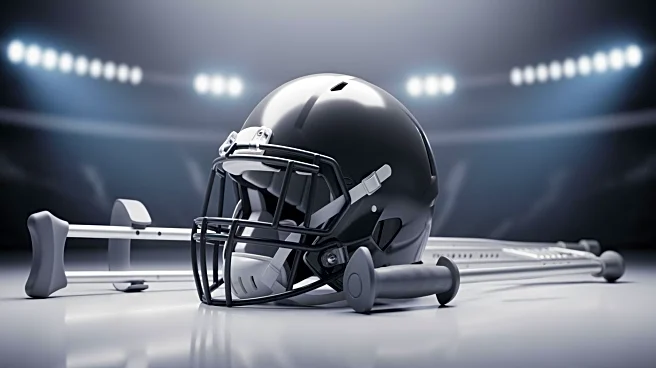What's Happening?
Drake London, the Atlanta Falcons' leading wide receiver, has been ruled out for the Week 8 game against the Miami Dolphins due to a hip injury. London was initially listed as questionable after appearing on the injury report on Friday. Despite hopes
that he might play, the Falcons confirmed his inactive status just hours before the game. This decision follows a late downgrade in his condition, leaving the team to rely on other players such as Darnell Mooney and Kyle Pitts to bolster their passing attack. London's absence is a significant blow to the Falcons, who are also dealing with quarterback Michael Penix Jr.'s knee injury, potentially affecting their offensive strategy.
Why It's Important?
Drake London's absence is a critical development for the Falcons, as he ranks as WR12 in fantasy points per game, making him a key player in their offensive lineup. His unavailability could impact the team's performance against the Dolphins, who have been effective in limiting fantasy points for receivers this season. The Falcons will need to adjust their strategy, potentially increasing the roles of Mooney and Pitts. This situation also highlights the team's vulnerability to injuries, which could affect their standings and playoff prospects. Fantasy football players will need to reconsider their lineups, as London's absence might alter expected outcomes.
What's Next?
With London out, the Falcons will likely focus on enhancing the roles of other receivers and tight ends to compensate for his absence. The team will also need to address the quarterback situation, as Michael Penix Jr.'s injury could lead to Kirk Cousins starting. These adjustments will be crucial in maintaining competitive performance against the Dolphins. The Falcons' coaching staff will need to strategize effectively to navigate these challenges and optimize their offensive capabilities. Fans and analysts will be watching closely to see how these changes impact the team's dynamics and overall performance.
Beyond the Headlines
The Falcons' current injury challenges underscore the broader issue of player health and management in the NFL. Teams must balance the immediate need for performance with long-term player health, which can affect career longevity and team success. This situation also raises questions about the effectiveness of injury prevention and management strategies within professional sports. As teams face increasing pressure to perform, the ethical considerations of player welfare become more prominent, potentially influencing league policies and team practices.



















